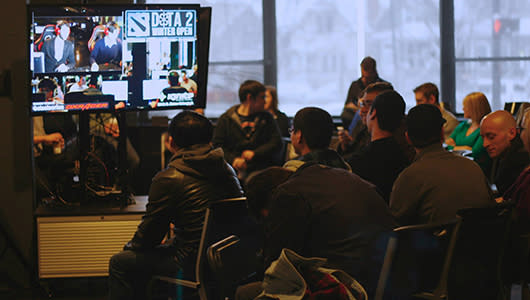Bridging the gap between casual and pro at the Chicago Dota 2 Winter Open
At Ignite Gaming Lounge in Chicago, Illinois, the crowd is losing its mind. It's grand finals of the Chicago Dota 2 Winter Open, a two-day, double-elimination, 16-team throwdown, and for some reason someone has just picked Meepo. For those of you who aren't in the Dota 2 loop, suffice to say that Meepo isn't a standard hero pick for a tournament. Picking Meepo in a match with $1,000 on the line is a lot like jumping out of a plane and wishing for a parachute -- an incredible, amazing story if it works and an embarrassing, painful death if it doesn't, with the odds heavily on the latter.
The announcers, broadcasting the match simultaneously on Dota TV (Dota 2's in-game spectating client) and Twitch, are dumbfounded. The chat channels are exploding. And as everyone witnesses the Meepo gamble pay off in the most incredible way, the excitement only expands and intensifies. But perhaps what's most special about this Meepo pick, about this final game between two local teams that have bested challenger after challenger, is not the risky strategy or the money on the line.
What's special is that anyone is watching it at all.
Thriving live
Long before players find themselves surrounded by the giant TV screens, thundering crowds, and booming announcers common to professional e-sports events, those players are simply enthusiastic gamers sitting in a computer chair just like everyone else. At some point, however, those regular gamers begin to realize that their skills are significantly above the skills of the other players they encounter. Maybe it's a group of friends who play Counter-Strike every weekend and suddenly notice that they haven't lost a match in weeks. Maybe it's an individual who puts countless hours into understanding the deep meta of a particular MOBA and then hungers for a greater challenge than what the public queues can offer. Whatever the specific circumstance, the origin is always the same.
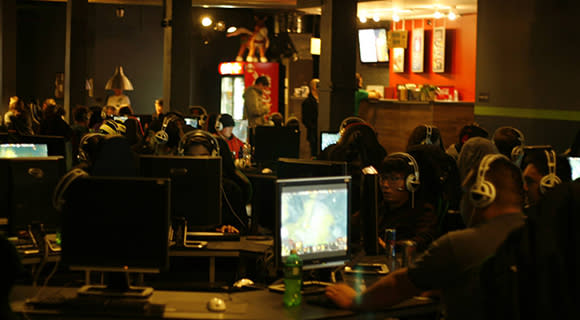
Unfortunately for gamers looking to go pro, e-sports haven't quite developed to the point that there's a clear path from point A to point B. Football, baseball, and basketball draw from deep talent pools honed by years of college competition. By the time those athletes hit the big stage, they understand what is expected of them and what a fully competitive life will be like. There isn't really an analogue to this in the world of e-sports. Players are, for the most part, either pro or not. Climbing the competitive ladder is done via online competition or low-key local tournaments until players are thrust into the limelight at MLG, The International, or DreamHack. And of course, no team has actually proved its worth until it has won in a live, high-stakes tournament environment.
The Chicago Dota 2 Winter Open was designed as a sort of stepping stone between casual and pro, a hybrid event built around engaging the local gaming community, getting people to meet face-to-face, stewing a few rivalries, and giving curious players a taste of what professional tournament play is actually like. As Ignite community manager Megan Thaler puts it, "There exists a huge gap between playing at home and playing professionally, and we hope to help bridge that gap with solid local events, where players can come out, meet each other, and compete in a live setting."
In other words, this tournament, the third Dota 2 mash-up for Ignite this year, was created to blur the line between average gamer and professional player.
The not-so-deep end
Ignite's tournament experience is designed to mirror that of big league competitions. Announcers were in-house to livecast matches. Dota 2 fans could buy a digital ticket to watch the tournament via Dota 2's built-in spectating client. And the entire event was broadcast via Twitch. Players were able to compete face-to-face, many for the first time, in a foreign environment echoing with the cheers of an audience. Those players were also given the opportunity to participate in post-match interviews and the other trappings of professional competitive play, something they've likely never done before. It's the pro experience, distilled and contracted.
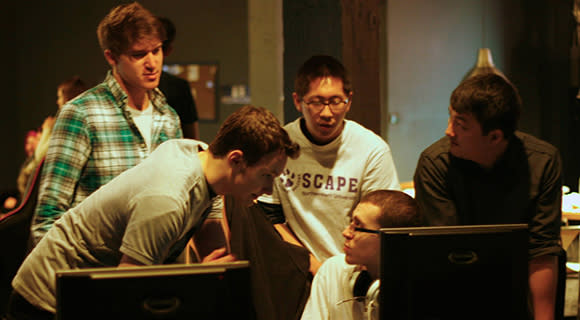
Says Thaler, "To our knowledge, we're doing something fairly unique in the US. Most local events fail over lack of profit. No LAN centers seem to run strong tournaments; venue-organized tournaments fall through constantly because the venue doesn't see any profit. There are also local tournaments that will rent out venues, but they often run into problems with the sheer amount of cost and organization that goes into an event. These tournaments often don't pay out what they promise to players." Thaler and the Ignite staff see the Chicago Dota 2 Winter Open as a potential blueprint for other mid-level tournaments, explaining, "Ignite aims to develop a well-grounded model for the local competitive scene, which could also be applied to the national scene."
There are dangers to expansion. This Dota 2 tournament was markedly different from the one I covered in the summer. Teams were more intense, pre-tournament trash talk more prevalent, and the "we're all just here for some fun" feeling seemed to have faded just a bit. Some of the teams came to win and weren't necessarily concerned with making friends along the way. In fact, there was a fair bit of concern in the Chicago Dota 2 community regarding teams coming in from other regions with semi-pro or pro players simply to roll the locals and make off with the prize money. These teams, known as "stacks," were seen as a threat to the fun, open, and community-centric atmosphere of previous events.
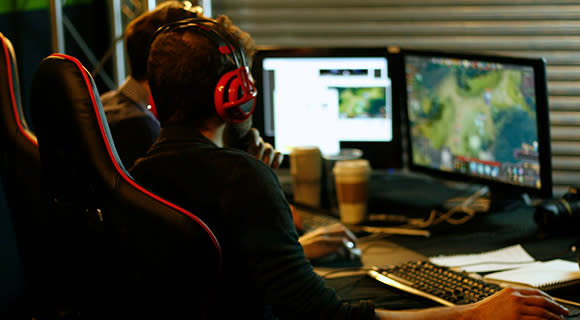
To Ignite, however, stacks represent both the positive and the negative of growing a successful event. "Obviously the larger a tournament becomes," concedes Thaler, "the more likely it is to attract a national crowd, and suddenly there are pro teams sweeping the prize pools, instead of locals. It's completely understandable that local players look negatively on stacked teams. But it's also not yet at a point where the stacked teams are unbalancing the brackets, and we'd like for that to continue. I think a bit of stacking brings fantastic competition, and as long as we're not bringing in Na'Vi, the locals still stand a chance." Thaler's point is backed by the fact that all three Chicago Dota 2 open tournaments have been won by a local team.
Overall, Thaler emphasizes that Ignite's open tournaments are there as an opportunity for local teams looking to take the big leap. "Many of the top teams at these events are talented enough to move on to national tournaments. However, many of them have had little to no experience at live events, which is a very important aspect that players often don't consider. LAN centers can give teams a first taste of live competition and help them be used to playing outside of home and side-by-side with their teammates."
Growing as a community
While it would be disingenuous to write off Ignite's financial interest in drawing a crowd, raising awareness of its brand, and packing its facility for two days, the LAN center might still be onto something with this idea of mid-level, high production value events. There really is no substitute for competing live with an audience, and every team that competed at the Chicago Dota 2 Winter Open is almost certainly stronger for the experience. The bonds of community between those players are also stronger (my Steam friends list has almost doubled since attending). As Thaler puts it, "People shake hands and compliment each other's play at tournaments. Personally, the positivity keeps me going, and Ignite is happy to help cultivate that in the Dota 2 community."
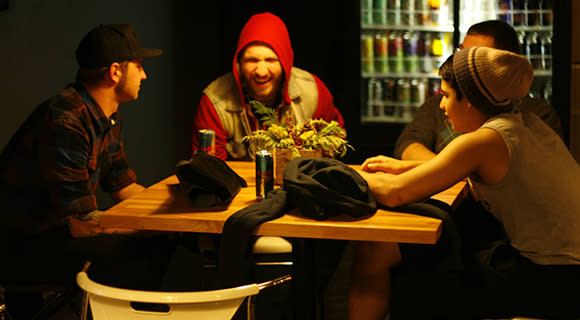
As for whether we'll be seeing Chicago favorites like Ice Cream City, Hop in Ink's Backpack, Call Me LEGEND, and Team Fear at the International 4 next year, well, time will tell. If a team can take the championship with a last-minute Meepo pick, anything must be possible.

